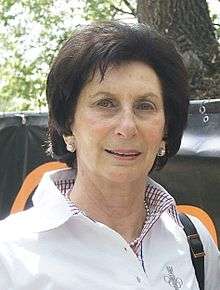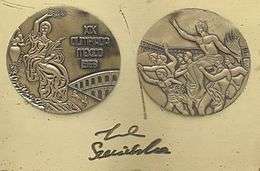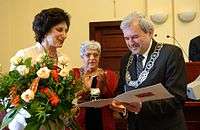Irena Szewińska
 Irena Szewińska in 2012 | |||||||||||||||||||||||||||||||||||||||||||||||||||||||||||||||||||||||||||||||||||||||||||||||||||||||||||||||||||
| Personal information | |||||||||||||||||||||||||||||||||||||||||||||||||||||||||||||||||||||||||||||||||||||||||||||||||||||||||||||||||||
|---|---|---|---|---|---|---|---|---|---|---|---|---|---|---|---|---|---|---|---|---|---|---|---|---|---|---|---|---|---|---|---|---|---|---|---|---|---|---|---|---|---|---|---|---|---|---|---|---|---|---|---|---|---|---|---|---|---|---|---|---|---|---|---|---|---|---|---|---|---|---|---|---|---|---|---|---|---|---|---|---|---|---|---|---|---|---|---|---|---|---|---|---|---|---|---|---|---|---|---|---|---|---|---|---|---|---|---|---|---|---|---|---|---|---|---|
| Born |
24 May 1946 (age 70) Leningrad, Russia | ||||||||||||||||||||||||||||||||||||||||||||||||||||||||||||||||||||||||||||||||||||||||||||||||||||||||||||||||||
| Height | 1.76 m (5 ft 9 in) | ||||||||||||||||||||||||||||||||||||||||||||||||||||||||||||||||||||||||||||||||||||||||||||||||||||||||||||||||||
| Weight | 60 kg (130 lb) | ||||||||||||||||||||||||||||||||||||||||||||||||||||||||||||||||||||||||||||||||||||||||||||||||||||||||||||||||||
| Sport | |||||||||||||||||||||||||||||||||||||||||||||||||||||||||||||||||||||||||||||||||||||||||||||||||||||||||||||||||||
| Sport | Athletics | ||||||||||||||||||||||||||||||||||||||||||||||||||||||||||||||||||||||||||||||||||||||||||||||||||||||||||||||||||
| Club | Polonia Warszawa | ||||||||||||||||||||||||||||||||||||||||||||||||||||||||||||||||||||||||||||||||||||||||||||||||||||||||||||||||||
Medal record
| |||||||||||||||||||||||||||||||||||||||||||||||||||||||||||||||||||||||||||||||||||||||||||||||||||||||||||||||||||

Irena Szewińska, née Kirszenstein (Polish pronunciation: [iˈrɛna ʂɛˈviɲska]; born 24 May 1946) is a Polish retired sprinter who was one of the world's foremost athletes for nearly two decades, in multiple events.[1][2][3][4][5][6]
Early and personal life
Irena Kirszenstein was born in Leningrad to a Jewish family.[7][8][9][10] Her father came from Warsaw and mother from Kiev. They met in Leningrad where they studied at the time, and in 1947 moved to Warsaw.[11]
In 1967 she married her coach, Janusz Szewiński,[12] who also competed in hurdles at the national level and later worked as a sports photographer.[13] They have two sons, Andrzej Szewiński (born 1970), who played volleyball for the national team and later became a senator, and Jaroslaw (born 1981).[13]
In 1970 Szewińska graduated from the University of Warsaw with an MSc degree in economics.[13]
Career

Between 1964 and 1980 she participated in five Olympic Games, winning seven medals, three of them gold. She also broke six world records and is the only athlete (male or female) to have held a world record in the 100 m, 200 m and the 400 m events. She also won 10 medals in European Championships. Between 1965 and 1979 she gathered 26 national titles and set 38 records in the 100–400 m sprint and long jump.[12]
At her first Olympics in Tokyo in 1964, she took a Silver medal in the Long Jump and 200 metres, and ran the second leg of the Gold medal winning 4 X 100 meter relay team.
She was a double sprint winner at the World Student Games in Budapest in 1965.
In 1966, at the European Athletics championships she won Gold in the long jump, 200 meters and 4 x 100 meter relay; and took a Silver in the 100 meter sprint.
At her second Olympics in Mexico, She won a bronze in the 100 meters, but failed to qualify for the Long Jump final. She recovered from that disappointment, to win the Gold medal in the 200 meters in a new World Record time. In the sprint relay the Polish team dropped the baton on the final exchange in the semi-final and finished last.
After giving birth to her son, in 1971 - she managed a bronze medal in the long jump at the European Championships in Helsinki. She would compete in the 3 events at the Munich Olympics in 1972, the 2 sprints and the long jump. She would come away with a bronze medal in the 200 meters.
In the 1974 season, she became the first woman to break the 50-second barrier for 400 metres, and she set a new world record of 22.21 s for 200 meters. At the European Championships in the Rome she won the sprint double of 100 meters and 200 meters, beating the favoured GDR sprinter Renate Stecher; and ran the anchor leg on the 4 x 100 meter relay team which took the bronze. She was ranked number 1 in the world in the 100, 200 and 400 m events in 1974.
She would win her final Olympic medal in Montreal in 1976, by winning the gold in the 400 metres in a world record time of 49.29.[12] At the inaugural World Cup of Track and Field in 1977, she would win both 200 metres and 400 metres; beating both favoured East German runners Barbel Wockel and Marita Koch respectively. She would be ranked number 1 in the world for 200 m and 400 m in 1976 and 1977.
In her final appearance at the European Championships at 32 year of age, she managed to win a bronze in the 400 meters and the 4 x 400 meter relay.
She was ranked number 1 in the world 7 times in the 200 metres; 4 times in the 400 metres, and 2 times in the 100 metres; as well as 3 times in the long jump. Over-all, she was ranked 15 years in the top ten at 200 metres, also 4 times number 2, twice at number 3, which just leaves 2 years outside the top 3; (from 1964 to 1977 she was ranked in the top 3 – 200 metre runners in the world) a remarkable achievement. She was ranked 12 times in the 100 metres, 8 times in the long jump and 6 times in the 400 metres (which she took up in 1974).
In 1998, Szewińska became d a member of the International Olympic Committee.[12] As of 2004, she is the head of the Polish Federation of Athletics.
On 3 August 2005, she was elected as the third woman to the IAAF (International Association of Athletics Federations) Council during the first session of the 45th IAAF Congress in Helsinki.
She is a member of the International Jewish Sports Hall of Fame, and the IAAF Hall of Fame.[14][15]
Medals and championships timeline
| Year | Games | Where | Event | Notes |
|---|---|---|---|---|
| 1964 | 1964 Summer Olympics | Tokyo | 4 × 100 m 200 m long jump |
Gold, 43.6 – WR Silver |
| 1965 | 100 m sprint 200 m |
11.1 – WR 22.7 – WR | ||
|
1965 |
1965 World University Games | Budapest | 100m 200m |
Gold Gold |
| 1966 | European Championships | Budapest | 200 m sprint long jump 4 × 100 m 100 m |
Gold Gold Gold Silver |
| 1968 | 1968 Summer Olympics | Mexico City | 200 m 100 m |
Gold 22.5 WR Bronze |
| 1971 | European Championships (outdoor) | Helsinki | 200 m | Bronze |
| 1971 | European Championships (indoor) | Helsinki | Long jump | Silver |
| 1972 | 1972 Summer Olympics | Munich | 200 m | Bronze |
| 1974 | European Championships (outdoor) | Rome | 100 m 200 m 4 × 100 m |
Gold Gold Bronze |
| 1974 | European Championships (indoor) | Rome | 60 m | Bronze |
| 1975 | European Championships (indoor) | 60 m | Bronze | |
| 1976 | 1976 Summer Olympics | Montreal | 400 m | Gold 49.29 – WR |
| 1977 | 1977 World Cup of Athletics | Düsseldorf | 200 m 400m 4 × 400 m |
Gold Gold Silver |
| 1978 | European Championships | Prague | 400 m 4 × 400 m |
Bronze Bronze |
| 1979 | 1979 World Cup of Athletics | Montreal | 400m | Bronze |
See also
References
- ↑ Joseph Siegman (2000). Jewish sports legends: the International Jewish Hall of Fame. Brassey's. pp. 176–177, 252–253. ISBN 1-57488-284-8.
- ↑ Robert Wechsler, Bob Wechsler (2007). Day by Day in Jewish Sports History. KTAV Publishing House, Inc. pp. 36, 40, 54, 70, 145, 157, 165, 21, 221, 246, 248, 288–289, 292–293, 295. ISBN 0-88125-969-1.
- ↑ Mordecai Schreiber; Alvin I. Schiff; Leon Klenicki (2003). The Shengold Jewish Encyclopedia. Schreiber Pub. pp. 246, 300. ISBN 1-887563-77-6.
- ↑ Peter S Horvitz (2007). The Big Book of Jewish Sports Heroes: An Illustrated Compendium of Sports History and the 150 Greatest Jewish Sports Stars. SP Books. p. 22. ISBN 1-56171-907-2.
- ↑ Paul Taylor (2004). Jews and the Olympic Games: the clash between sport and politics : with a complete review of Jewish Olympic medallists. Sussex Academic Press. pp. 138, 192, 243. ISBN 1-903900-87-5.
- ↑ Mariah Burton Nelson, Lissa Smith (1998). Nike is a Goddess: The History of Women in Sports. Atlantic Monthly Press. p. 22. ISBN 0-87113-761-5.
- ↑ "Irena Kirszenstein-Szewinska". jewishvirtuallibrary.org.
- ↑
- ↑ "The International Jewish Sports Hall of Fame". google.com.
- ↑ "Day by Day in Jewish Sports History". google.com.
- ↑ Rozmowa z Ireną Szewińską. bieganie.pl. 18 May 2012
- 1 2 3 4 Irena Szewińska-Kirszenstein. sports-reference.com
- 1 2 3 SZEWIŃSKA (KIRSZENSTEIN) IRENA. pkol.pl
- ↑ Joseph M. Siegman (1992). The International Jewish Sports Hall of Fame. SP Books. pp. 96, 170–171. ISBN 1-56171-028-8.
- ↑ Carolyn Starman Hessel (1999). Blessed Is the Daughter. Shengold Books. pp. 123–124. ISBN 1-887563-44-X.
External links
| Wikimedia Commons has media related to Irena Szewińska. |
- Jews in Sports
- KIRSZENSTEIN-SZEWIŃSKA, Irena International Who's Who. accessed 4 September 2006.
| Awards | ||
|---|---|---|
| Preceded by None |
United Press International Athlete of the Year 1974 |
Succeeded by |
| Preceded by None |
Women's Track & Field Athlete of the Year 1974 |
Succeeded by |
| Sporting positions | ||
| Preceded by |
Women's 200m Best Year Performance 1974 |
Succeeded by |
| Preceded by |
Women's 200m Best Year Performance 1977 |
Succeeded by |